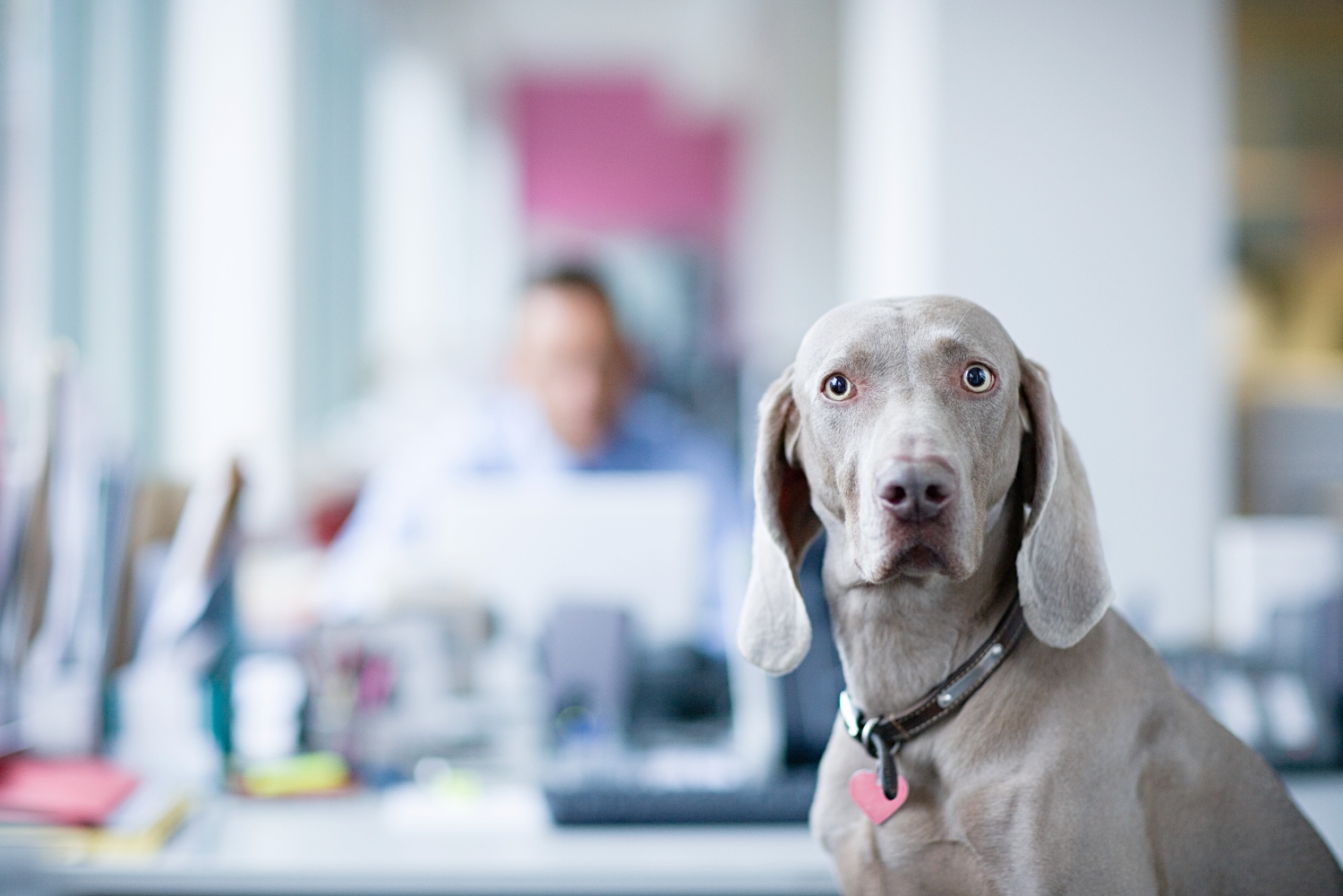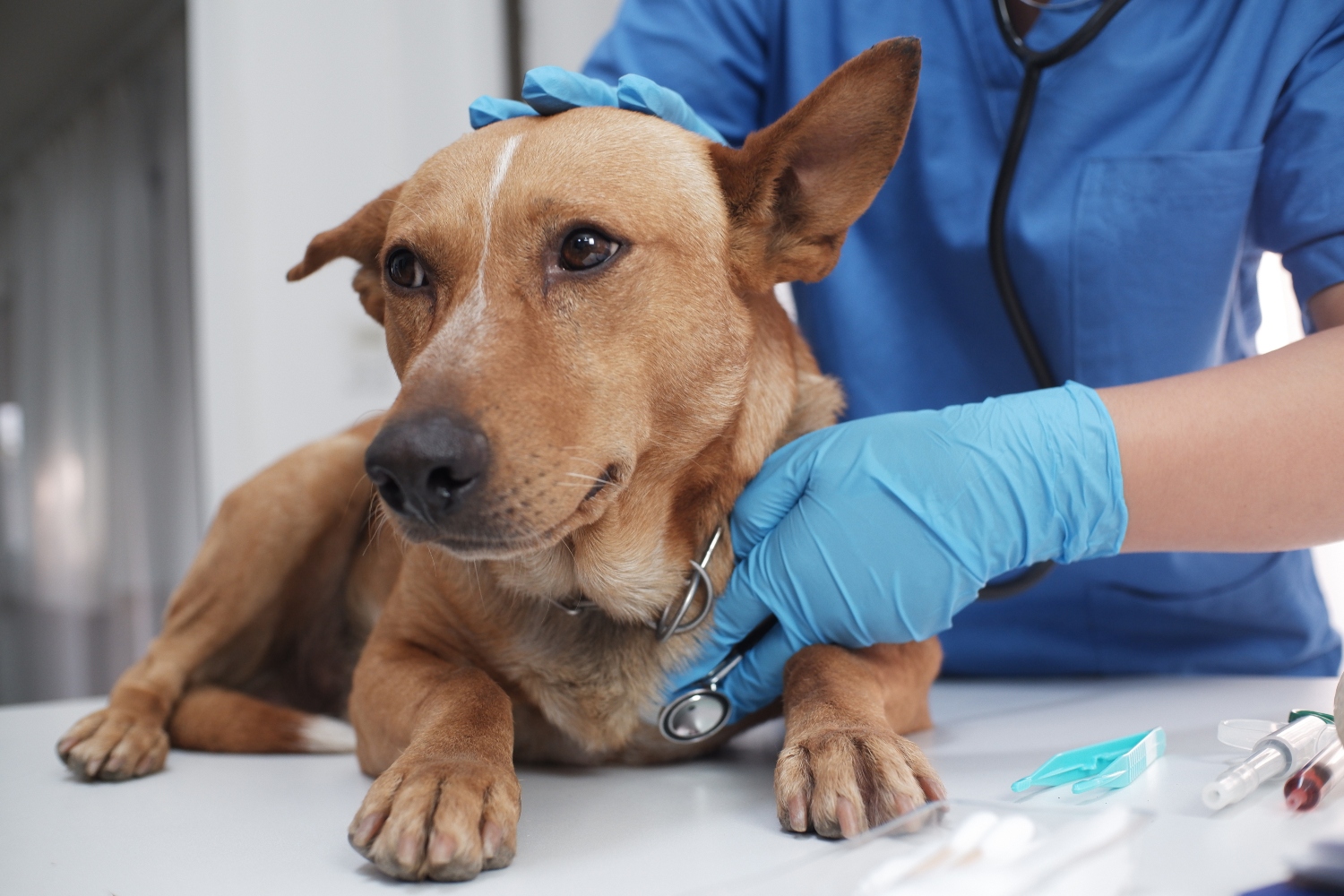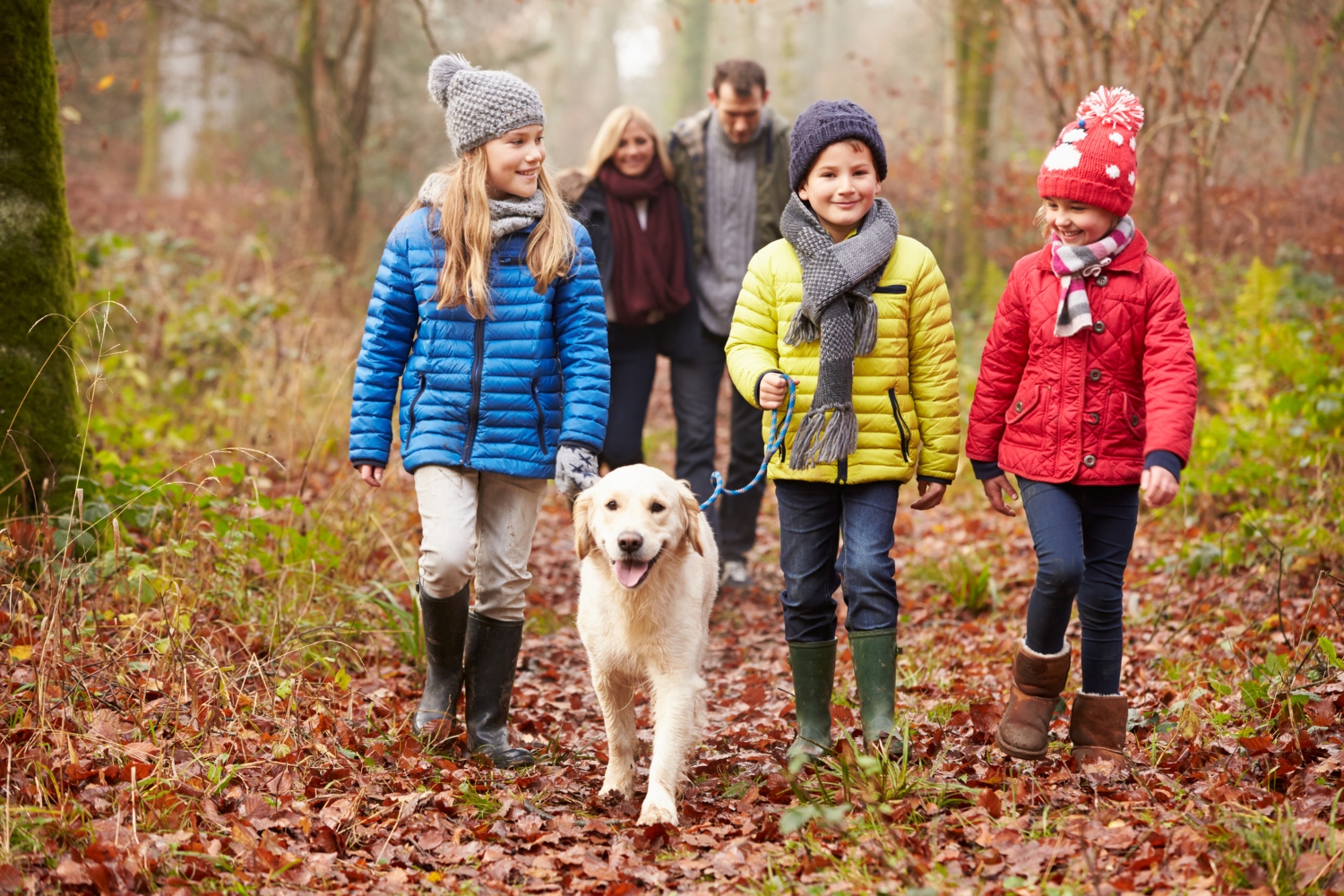
How to spot the signs of dementia in dogs
21st March, 2023
The thought of your dog getting dementia might worry you, but there's lots you can do to help your elderly pooch. Get to know the signs of dementia in dogs and care tips in this Petwise guide.
You're out on a long walk across fields in the glorious sunshine with your canine companion. There's not a cloud in the sky and the sounds of nature fill your ears – it's idyllic. But wait! Where's your dog? Is that them wandering off with a stranger in another direction? Sound familiar?
Perhaps your pooch no longer greets you at the door when you come in or they seem to stare blankly into space for what seems like hours. While it might seem easy to dismiss these 'odd' behaviours as senior moments (we all get them), they could be signs your dog is developing canine cognitive dysfunction syndrome.
To help you spot the condition early on, we explore the tell-tale signs you should be watching for. Discover how you can help care for your dog after diagnosis and how protecting your pet with senior dog insurance in the UK can support you both through the change.
What is dog dementia?
Canine cognitive dysfunction (CDD), or doggy dementia, is a cognitive disorder that affects dogs similarly to how Alzheimer's affects humans. The condition happens as your pet's brain ages, impacting their learning, comprehension and memory and causing them to behave differently.
If your dog is still young, you probably don't have too much to worry about, but National Geographic states that a canine's risk of developing the condition increases by half every year. Another study mentions that once a pooch reaches the grand old age of 15, they have a 68% chance of developing dementia.
So, does age-related cognitive decline affect all dogs the same? Not exactly – there are four forms of dog dementia. Let's take a closer look.
Dysthymia
This type of dog dementia seems to affect how your canine perceives its own size, often causing them to get stuck. Walking backwards is usually the simplest way to solve their problem, but they just stand there not knowing what to do.
You might also notice disruptions to their sleep wake cycle, aggressive behaviour and whining.
Involutive depression
Just like chronic depression in humans, an elderly dog can develop this later in life.
One symptom of canine dementia is toileting around the house, which we get can be frustrating to dog owners, but you need to do your best to keep calm. Although you might feel like telling them off, this could lead to more anxiety and worsen their symptoms. Dogs with depression may also appear lethargic, sleep poorly and become more vocal.
If you believe your older pet is feeling blue, take them to the vet. Anxiety and depression can be symptoms of various health concerns, and your vet will be able to identify the underlying cause. Your greying pooch might need lots of tests and treatment, but Petwise senior dog insurance in the UK can help.
Confusional syndrome
Forgetfulness is one of the symptoms many of us associate with Alzheimer's, and this form of canine dementia is similar. Confusional syndrome primarily affects memory, causing your pooch to forget their surroundings and even other dogs and their pet parents. It can be very distressing seeing your old dog lose their memory, but they need your support and care now more than ever.
Hyper-aggression
Older dogs with dementia of this kind tend to lose their ability to properly communicate with other animals and people, sometimes causing them to develop aggressive behaviours.
What are the signs of dementia in dogs?
Not all forms of canine dementia are the same and the symptoms gradually worsen as the disease progresses, ranging from mild to severe. Here are some of the more common symptoms of dog dementia:
- Anxiety and depression
- Confused and disorientated
- Extreme irritability
- Not remembering familiar commands and previously learned training
- Slower at learning new tasks/skills
- Appearing lost and wandering aimlessly in familiar places
- Less interested in playing with family members and other pets
- Toileting around the home when previously house trained
- Disruption of sleep patterns (learn more about sleeping problems in older pets elsewhere on our site)
- Not responding to their name
- Lack of self-grooming
- Staring blankly into space
Any of the above signs of dementia in dogs can be mistaken as part of the ageing process as well as point to other serious health concerns in older dogs. So, whisking your pet to the vet should be the first thing you do.
And remember, if you have senior dog insurance in the UK with Petwise and need some quick advice, you can use our 24-hour vet video service for no extra cost.
How is canine cognitive dysfunction diagnosed?
Your furry friend has shown signs of dog dementia – what's next? Your vet will likely run tests to rule out other health problems and may use an MRI to make the final diagnosis. These tests can cost quite a bit, but your senior dog insurance in the UK can help with the bill.
Ideally, you'll take your pet to the vet for regular check-ups, which can help identify the early signs of cognitive dysfunction. When dementia symptoms are caught in time, it could improve your dog's quality of life in the long run.
Senior dog insurance in the UK doesn't include routine vet visits, but they are part of the pet care you should budget for when owning a dog.
What causes canine dementia?
The exact reason for dog dementia is unknown, but it's likely that many of the causes of cognitive decline in humans are the cause of these changes in a senior dog's brain. This means that simply getting old along with physical and chemical changes affect brain function, leading to dog dementia.
These aren't the only probable causes, though. Genetic factors and brain trauma or tumours might also put senior dogs at risk.
Can I prevent canine cognitive dysfunction?

No dog parents want to see their beloved pet slowly lose their cognitive function and not recognise family members and other pets. So, what can you do to slow down the process in your dog's brain?
Without properly understanding the cause, it's difficult to know exactly which preventable measures to take, but making sure your pet is generally fit and well is key to a sharp and healthy mind. Here are a few tips:
- Teach them new skills (who said an old dog can't learn new tricks?).
- Take them out for plenty of walks (we've got a guide to walking your older dog if they're starting to slow down a bit).
- Play plenty of games outdoors and at home.
- Provide a balanced, whole food diet.
- Keep them mentally active with puzzle feeders and other toys for mental stimulation.
- Take them out for regular socialisation – avoid putting off meeting other animals unless they show signs of aggression.
- Think about brain-healthy supplements as part of their natural diet.
- Take your dog for regular vet check-ups.
- Protect your pet with senior dog insurance in the UK in case they do become ill.
What is the cure for doggy dementia?
At present, there's no cure for doggy dementia. The condition causes gradual, physical deterioration to your dog's brain, and there's currently no simple procedure to regenerate damaged tissue.
However, we're sure you'll be pleased to hear that hope is on the horizon! There's plenty of research being done regarding canine dementia, and potential cures have been tested involving the medicine Ropesalazine and stem cell therapy. There are also ways to monitor your dog's CCD to help you and your vet manage symptoms.
Treatment for dementia in dogs
There might not be a certified treatment for our canine companions just yet, but that doesn't mean there aren't options.
Speak with your vet to see what works best for you and senior pet to make sure your dog still enjoys a good quality of life for as long as possible.
Below are a few of the treatment options you can expect to help manage canine dementia symptoms.
Changes to your dog's diet
Certain foods may boost your dog's cognitive function, especially a diet rich in:
- Flavonoids
- Vitamins B, C and E
- Antioxidants
- Beta carotene
- Carotenoids
- Carnitine
A nutrient-rich diet like this could help senior dogs with dementia regarding their memory, learning ability and general brain health.
If your vet recommends prescription senior dog food and you're concerned about the costs, don't worry. With Petwise senior dog insurance in the UK, you get a contribution towards your pet's senior food to make sure they get the nutrition they need.
Supplements to boost brain function
Just like with a special diet, natural supplements may benefit dogs with cognitive dysfunction, like melatonin (to help their sleep cycle) and extra vitamin B. Speak to your vet about what's right for your faithful friend.
Prescription veterinary medicine
Depending on the signs of dog dementia in your pet, your vet might suggest prescription medication, especially if they also suffer from anxiety.
Life enrichment
This is where you come in. As a responsible pet parent, you'll need to make the world easier to navigate for your senior pooch while ensuring they still get the exercise they need.
We'll go into more detail below, but pet-proofing your home like you would for a puppy can reduce the risks to senior dogs, especially when they become unfamiliar with their surroundings.
You'll still need to take your dog out for plenty of walks, but this might mean they no longer enjoy extensive runs off the lead.
Animal behaviourist
Some dogs with dementia become aggressive and develop other negative behaviours, like separation anxiety, that affect their quality of life as well as your general home environment.
You might be able to manage symptoms and slow dog dementia progression by speaking to a board certified veterinary behaviourist – you can find an extensive list of professionals on the Animal Behaviour and Training Council website.
Caring for your dog with dementia
If your long-serving loyal companion is showing clinical signs of dementia in dogs, don't worry. Although it can be upsetting to see your once playful pup feeling lost in familiar places, you can still help them lead a good quality of life by taking good care of them.
Encourage healthy sleeping habits
Many pooches with dog dementia experience a big disruption to their sleep wake cycle. You might notice your beloved hound:
- Snoozing throughout the day.
- Pacing and panting when everyone's asleep.
- Becoming more vocal during the night.
Not only can this be frustrating for your household, but you might soon get a hoard of disgruntled neighbours turning up on your doorstep! So, what can you do to help your confused dog?
First, take them to the vet. Other conditions like kidney disease and urinary tract infections might be causing their restlessness, making them need the toilet throughout the night. Once other potential causes are eliminated, it's time to fix these disruptive sleep patterns.
- Keep your dog active and stimulated during the day.
- Expose them to plenty of sunlight to help their sleep wake cycle adjust.
- Consider nutritional supplements to help them drop off at night – speak to your vet before giving them to your dog.
- Invest in an orthopaedic foam dog bed. Tired and stiff muscles and joints could be contributing to a bad night's sleep.
Remember to use our 24-hour vet video service if you need more advice on helping your older pet fall asleep and have senior dog insurance in the UK with us.
Pet-proof your home
Do you remember when your golden oldie was once a bounding puppy and you had to keep them out of danger? Well, now it's time to pet-proof your home again and avoid a nasty accident.
Dogs with dementia can get lost in even the most familiar surroundings and forget previously learned rules like keeping away from cables and the oven while you're cooking. The last thing you want is to be claiming on your senior dog insurance in the UK for something that could have easily been prevented.
You can help them after dark, too, by providing a nightlight to allow them to navigate if they do need to get up.
Provide stimulating activities
Keeping your dog physically and mentally stimulated is one of the best ways to help your confused canine cope and slow down the process of CCD.
Play games with your old hound and provide a selection of toys to keep their mind busy while they spend time alone. Check out these gifts to make them feel young again!
Never reduce their time outdoors – even if they're struggling to walk far, they can still enjoy fresh air and sunlight in a wagon or stroller!
Establish a solid routine
Dogs are creatures of habit, and sticking to a routine may help minimise their dementia symptoms.
Feed them and go out for walks at the same time every day. Keep to the same bedtime and winding down routine every night to comfort them before you say goodnight.
Prepare for accidents
A common sign of dog dementia is toileting around the house, so it's likely you're going to face this issue sooner or later. How can you help your four-legged friend cope?
- Choose bedding with washable covers.
- Set up a potty pad near the door in case your senior needs the toilet during the night.
- Lay protective covers over furniture.
- Consider nappies if it starts to happen regularly.
- Never get cross with your dog. We know it can become frustrating cleaning up after them every day, but it will only make the problem worse and could even lead to anxiety.
We've got lots more helpful advice in our article on coping with incontinence in senior canines.
Avoid changes to your dog's environment
To help your canine senior citizen feel comfortable, keep your home and environment as familiar as possible. This means no rearranging the furniture or bringing new things home that could disrupt their surroundings.
Be kind
Perhaps the most important thing you can do when your pet gets dog dementia is to provide plenty of love and care by spending quality time together. Keep commands basic and short and adapt in any way possible to help your canine companion feel comfortable.
What is the prognosis for dog dementia?
With dog dementia diagnosed in your pooch, you might be wondering what your dog's life will look like from now on. Unfortunately, there's no straightforward answer.
Cognitive dysfunction is a gradual process that happens as canines age and like in humans with Alzheimer's, giving a general life expectancy is tough.
If you spot the initial symptoms and take action, you might be able to improve your dog's life more than when the signs get dismissed as part of growing old.
So, what's the best thing you can do for your senior citizen once they get diagnosed with CCD?
Stay strong and provide all the love and support they need to live comfortably and happily, which means preparing for those incidents that are bound to happen as dog dementia slowly progresses.
Will my pet with dementia be OK around my other dogs?
It depends. Some dogs will continue to be social around people and other pets even if they don't remember who they are. However, others can become aggressive and lash out at a canine companion who was once their favourite playmate.
First, get your dog to the vet to see if any other underlying causes are making them act this way. Once you're certain it's because of CCD, you may need to take steps to make sure everyone is happy at home, which could include structured social interaction between dogs and not keeping them in the same room if left alone.
Remember to make sure your pet is covered with senior dog insurance in the UK in case they do get into a situation that requires emergency . It must be noted that pre-existing conditions are not covered when seeking emergency care so try not to wait until there is a problem with your dog before taking out a pet insurance policy.
Get pet insurance before dog dementia develops

Watching your four-legged family member develop dog dementia is tough as a pet parent, and we don't want you to go through it alone.
With Petwise senior dog insurance in the UK, we're here to support you and your beloved pooch every step of the way.
Enjoy dental cover as standard, a senior food contribution and access to unlimited 24/7 vet video calls with FirstVet at no extra cost, to get help when you need it fast.
Don't wait any longer to give your elderly dog the protection it deserves. Contact Petwise today for a quick quote.